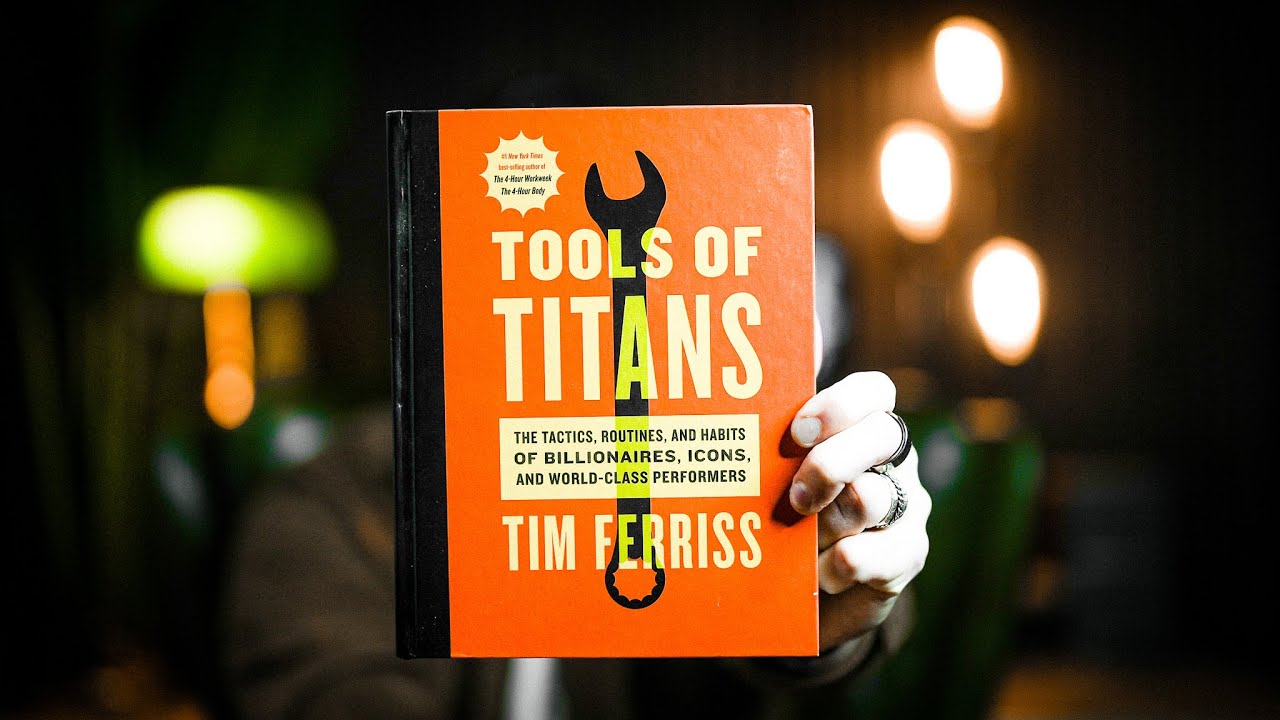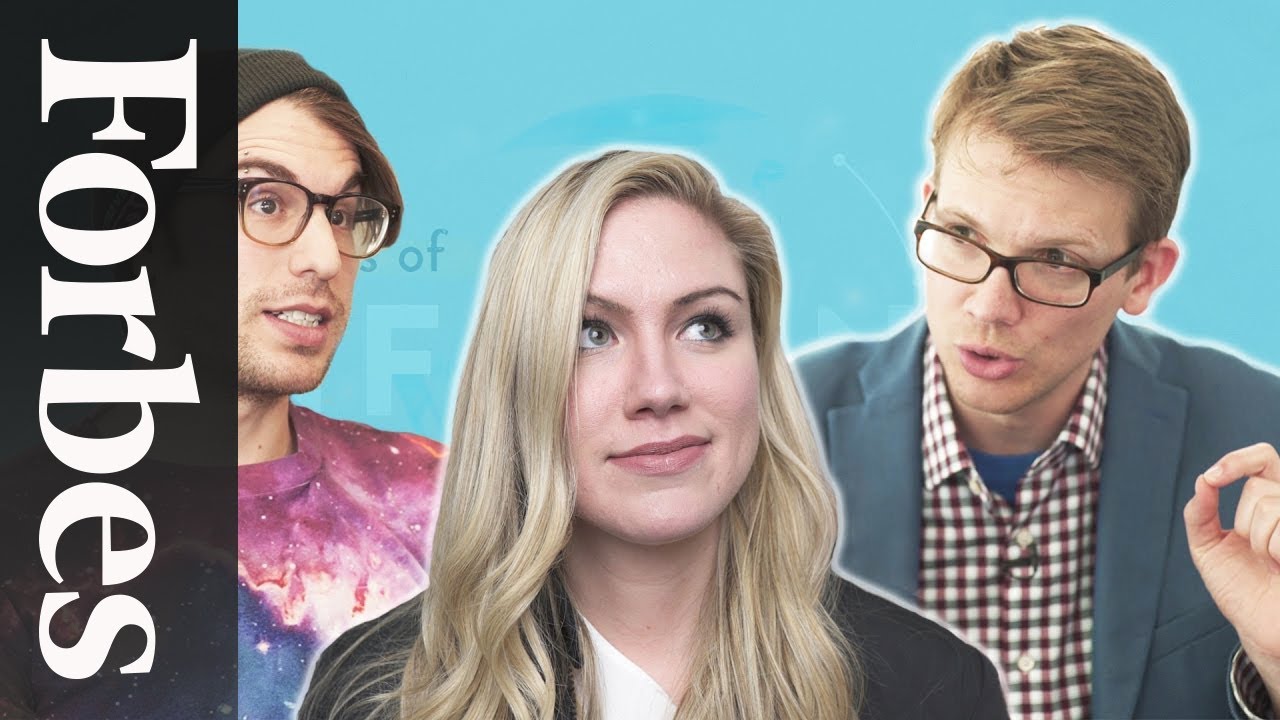20 Must Read Books For Entrepreneurs in 2018 – Part II
11. The Lean Startup: How Today’s Entrepreneurs Use Continuous Innovation to Create Radically Successful Businesses by Eric Ries
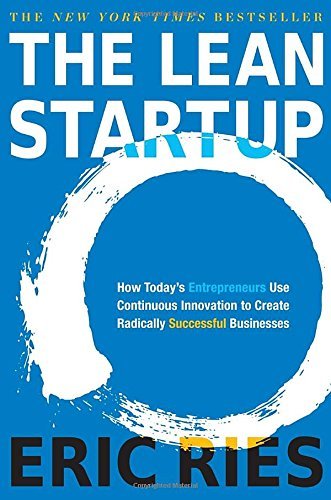
Most startups fail. But many of those failures are preventable. The Lean Startup is a new approach being adopted across the globe, changing the way companies are built and new products are launched. Eric Ries defines a startup as an organization dedicated to creating something new under conditions of extreme uncertainty. This is just as true for one person in a garage or a group of seasoned professionals in a Fortune 500 boardroom. What they have in common is a mission to penetrate that fog of uncertainty to discover a successful path to a sustainable business.
12. Start Your Own Business, Sixth Edition: The Only Startup Book You’ll Ever Need by The Staff of Entrepreneur Media
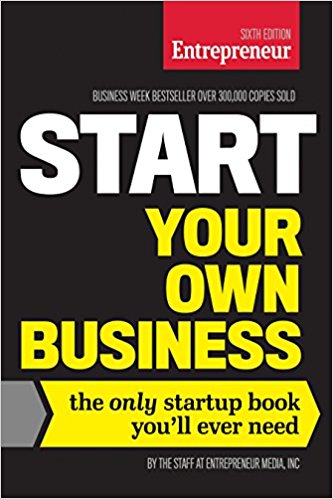
Tapping into more than 33 years of small business expertise, the staff at Entrepreneur Media takes today’s entrepreneurs beyond opening their doors and through the first three years of ownership. This revised edition features amended chapters on choosing a business, adding partners, getting funded, and managing the business structure and employees, and also includes help understanding the latest tax and healthcare reform information and legalities.
13. The Purpose Is Profit: The Truth about Starting and Building Your Own Business by Ed ”Skip” McLaughlin
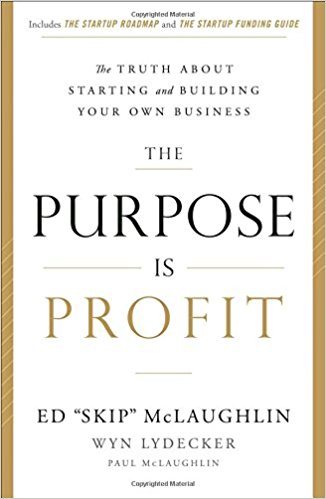
The book eliminates the mystery of becoming an entrepreneur. You will learn: why distinctive competence trumps passion,where and when to get funding without losing control, how to build an entrepreneurial brand that lasts, why profit should be factored into every business decision, how ethical behavior breeds trust and unlocks profit. As a bonus, The Purpose Is Profit includes two manuals: The Startup Roadmap details the 21 steps you should take to build a profitable business. The Startup Funding Guide delivers the tools you need to fund your business.
14. $100 Startup by Chris Guillebeau
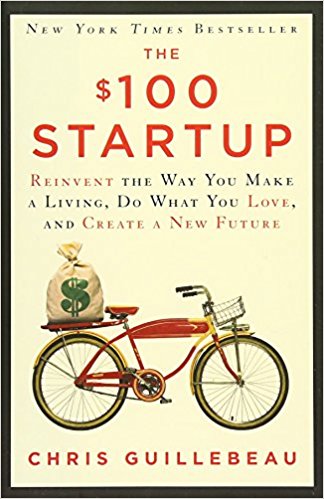
In preparing to write this book, Chris identified 1,500 individuals who have built businesses earning $50,000 or more from a modest investment (in many cases, $100 or less), and from that group he’s chosen to focus on the 50 most intriguing case studies. In nearly all cases, people with no special skills discovered aspects of their personal passions that could be monetized, and were able to restructure their lives in ways that gave them greater freedom and fulfillment.
In the book he wrote are the most valuable lessons from those who’ve learned how to turn what they do into a gateway to self-fulfillment. It’s all about finding the intersection between your “expertise” – even if you don’t consider it such — and what other people will pay for.
15. Zero to One by Peter Thiel
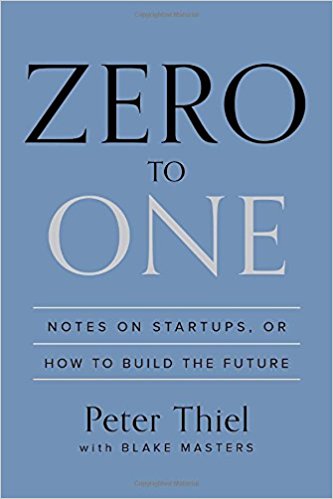
The book presents at once an optimistic view of the future of progress in America and a new way of thinking about innovation: it starts by learning to ask the questions that lead you to find value in unexpected places. Thiel begins with the contrarian premise that we live in an age of technological stagnation, even if we’re too distracted by shiny mobile devices to notice. Information technology has improved rapidly, but there is no reason why progress should be limited to computers or Silicon Valley. Progress can be achieved in any industry or area of business. It comes from the most important skill that every leader must master: learning to think for yourself.
16. The Founder’s Dilemmas by Noam Wasserman
17. Tools of Titans by Tim Ferriss
The latest groundbreaking tome from Tim Ferriss, the #1 New York Times best-selling author of The 4-Hour Workweek.
18. Crushing It: How Great Entrepreneurs Build Their Business and Influence-and How You Can, Too by Gary Vaynerchuk
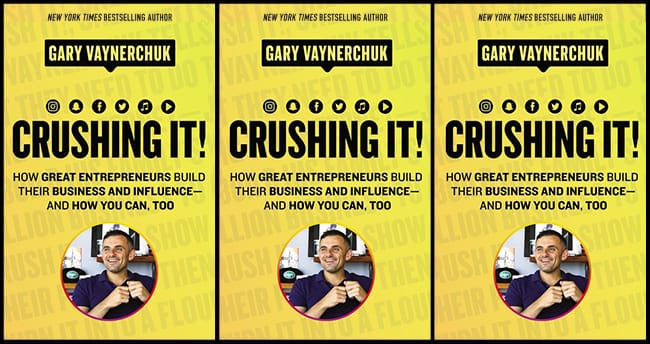
This new book chronicles brand new lessons, strategies, tactics, advice and inspiration pulled straight from both his own amplified business experience and that of dozens of other influencers and entrepreneurs from around the world. Vaynerchuk offers fresh tactical advice on how to become a household brand on social channels like Twitter, Facebook, YouTube, Instagram, and Snapchat; podcast platforms like Spotify, Soundcloud, iHeartRadio, and iTunes; and other emerging platforms like Musical.ly.
If you’re looking to build a brand that can grow your business, this is a must-read business book for the year. And though it’s a guide to building your own path to professional and financial success, remember that it’s not about getting rich. It’s about living life on your own terms, wrote ryrob.com.
19. The Startup Hero’s Pledge by Tim Draper
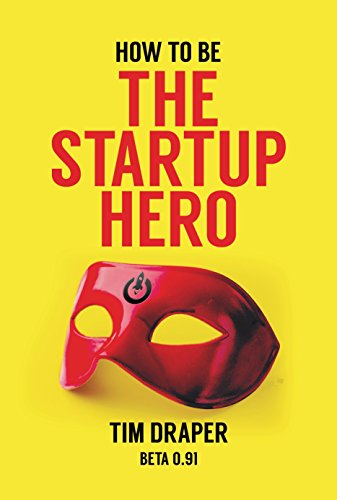
Startup Heroes are the ones that drive progress, and whether you bring us to another planet or make your neighborhood a nicer, happier place, you can become a Startup Hero. This book is the first step. It helps you take that first step. The step will be different for everyone. It might be to call that customer. It might be to draw up a design concept. It might be to talk to your boss. With this book, I hope to guide people to think big, drive change and go full speed ahead. I am giving them a pledge to do their work for good, and I am giving them some of the tools they need to accomplish their goals. – Tim Draper
20. Rework by Jason Fried
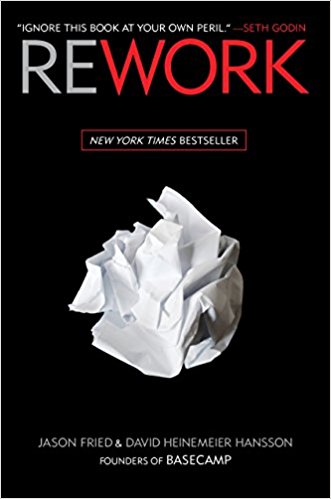
Most business books give you the same old advice: Write a business plan, study the competition, seek investors, etc. If you’re looking for a book like that, put this one back on the shelf. Read it and you’ll know why plans are actually harmful, why you don’t need outside investors, and why you’re better off ignoring the competition. The truth is, you need less than you think. You don’t need to be a workaholic. You don’t need to staff up. You don’t need to waste time on paperwork or meetings. You don’t even need an office. Those are all just excuses.
Instagram stories, AR, short-term content and chatbots – to be watched in 2018
Until now there has been a lot of talk about the Millennials, about how present they are in the digital environment and what type of content they prefer. After them comes strongly the Z Generation, meaning the people born between 1995-2012, that will represent 40 percent of the consumers’ market in 2020.
The manner in which they are changing the rules of the game and re-configuring the experiences with the brands is analyzed in the report Digital Recap 2018, created by The Bridge – Golin’s social media & digital hub – and the blogger Alex Ciuca (Hoinaru), available on www.digitalrecap.ro.
In the new Digital Recap we took a look at 2018 in which the relevance, measurement and analysis will count more than ever. The last year’s trends in content, storytelling, influencers and communities are refining and re-defining themselves in a new communication equation in social media. How memorable is in fact the ephemeral content and how are the brands adapting themselves to the new messages’ temporary reality, through what are the influencers differentiating themselves from the content creators and how is the social media influencing the buying power on this year’s digital agenda,” said Irina Roncea, deputy managing director, Golin.
Found at its seventh edition, the report presents the evolutions and trends in the digital environment, offering at the same time predictions and recommendations for the brands that want to be relevant for the new generation of consumers.
The star remains in 2018 the Instagram Stories, a channel that already attracts massive investment at a global level – almost 25 million companies worldwide publishing stories on Instagram. At the same time the Augmented Reality brings new changes in the interaction between brands and consumers, therefore it will rise the mix of offline-online experiences through viral elements added in real time to a store visit or while looking over a flyer. Also on a growing trend is the Virtual Reality, powered by the diversity and rising accessibility of the VR glasses’ models.
The ephemeral content represents an excellent manner of attracting and keeping the users for a longer period of time, if the brand is telling its story well. Insta Stories can contain teasers of product launches,
making ofs from their creation, exclusive content that can be discovered only in Stories, awards for fans and new communication opportunities with them. From its launch and until the present, the time spent by users in stories has been growing with 28 minutes, while 1 in 5 stories from a brand has been receiving a private message as response. Those are the reasons for which we believe is very important that the things a user sees bring him/her a plus value, in a way or another: to be useful and /or to be funny. A brand that will make its user feel privileged and rewarded for the times pent on its page will for certain have a future,” said Roxana Ionescu, Senior Digital Manager Golin.
Another visible trend for 2018 are the chatbots. Their number grew significantly in the last years, especially with the launch of the Facebook Messenger, in 2016. Therefore, 80 percent of the businesses are already using or planning to use them until 2020, while the global chatbots market is expected to reach USD 1.23 billion in 2025.
How 2017 looked in terms of numbers:
- Facebook has 2 billion users monthly;
- Time Warner invests USD 100 million in shows and ads on Snapchat;
- EUR 2,7 billion has to pay Google for a UE fine regarding a series of wrong doings on the comparing prices’ software of Google Shopping;
- 3000 people are hired by Facebook to check the posts and the videos reported as being hate speech or related to crimes;
- Intel paid 15,3 billion for the acquisition of Mobileye.
- EUR 1,7 million are invested by eMAG in the Zitec company;
- NBC holds 25% of Euronews;
- Amazon spent USD 13,7 billion in order to buy Whole Foods;
- The American company Equifax lost 143 million accounts.
Big influencers attract thousands of dollars for just a post on social media
Only 3% of the marketers said they planned to cut back on influencer marketing in the coming year, versus about 75% who anticipated spending even more on it, says emarketer.com. Moreover, according to the website, companies are paying the most for celebrity posts, especially on certain platforms. On average, posts by celebrities with at least 1 million followers (considered as influencers) cost nearly £65,000 each ($87,731), with Facebook posts demanding a leading rate of approximately £75,000 ($101,228).
Influencer marketing costs are going up in the UK, according to research by Rakuten Marketing and Morar Consulting, but prices per post vary considerably depending on reach and platform. This month, polling of UK marketers working directly on influencer programs from sectors including fashion, beauty and travel, approximately two-thirds of respondents had seen the prices influencers charge for posts go up in the past 12 months. In some industries, the costs were even higher, with some premium fashion brands, for example, paying celebrity influencers more than £160,000 ($215,954) per post.
“UK marketers are willing to pay celebrity influencers on Facebook up to £75,000 for a single post mentioning the brand they want to promote, a new survey has revealed. They are also prepared to pay celebrity influencers £67,000 for each YouTube video that mentions their brand, while key influencers on Snapchat can expect to be paid as much as £53,000 per Snap,” writes www.warc.com.
Spending was much more modest for so-called micro-influencers—those with 10,000 or fewer followers, due to the fact that only a fifth (20%) of marketers claim they are able to demonstrate the impact of influencers through indirectly influenced sales. Prices averaged at close to £1,350 ($1,822) per post, with YouTube and Facebook commanding the highest prices—more than £1,500 ($2,025)—and Snapchat the lowest at just over £1,000 ($1,350).
“Decision makers questioned from across a variety of sectors including fashion, FMCG, beauty and travel admitted that they would shell out as much as £53,000 per Snapchat post, which despite coming in at significantly less than the value they placed on other platforms, is notable given that Snapchat’s ephemeral nature means videos and pictures disappear within 24 hours of being posted,” said Rebecca Stewart for thedrum.com.
Overall, respondents said they would devote an average of 24% of their marketing budgets to influencer marketing in the next 12 months. That figure’s higher than the share of budgets that the largest percentage of marketers in the UK and US said they devoted to influencer marketing in a March 2017 study by Econsultancy. In that study, between half and six in 10 luxury and non luxury brand marketers said they invested less than 10% of their overall marketing budgets to influencer marketing. But the second largest shares of respondents were similar in their spending allotment to those in the Rakuten and Morar study.
Affiliate marketing firm Rakuten Marketing spoke to 200 UK marketers working on influencer programmes and found that post-for-post they were prepared to pay 12% more for Facebook endorsements than they were for YouTube. The research also found that despite the value brands clearly place on high-profile influencer slots, the majority of those asked (86%) admit they aren’t entirely sure how influencer fees are calculated. Which is pretty odd, especially after the last years of change in the media buying market, the restriction of budgets and the overall risen caution.
Why are the influencers so important for marketers when it comes to social media? According to The Economist, social media offer brands their best opportunity to reach cord-cutting millennials: Snapchat, for instance, reaches 40% of all American 18- to 34-year-olds every day.
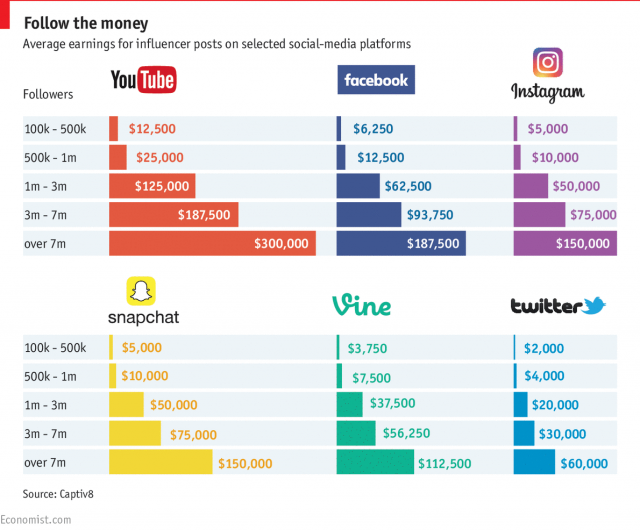
“Moreover, these platforms can make consumers feel they have gained unprecedented access to the lives of the rich and famous. That lets sponsors interact with their target audiences in ways that traditional advertising cannot match. In turn, demand from marketers for these channels has made social media lucrative territory for people with large online followings,” wrote the famous business magazine.
On the other hand, while 59 per cent of marketers state the influencers they work with will take guidance from them around best practice, 56 per cent of premium fashion marketers admit to a situation in which influencers hold all of the power. For example, only 20 per cent of marketers state influencers are prepared to follow their lead when it comes to guidance around billing.
Less than a third (29 per cent) believe that the influencers they work with are entirely concerned whether their content drives sales for the brand. Interestingly, when asked what would encourage marketers to invest more in an influencer programme, greater transparency and better reporting of influencer contribution to sales now rank as the highest factor (50 per cent).
James Collins, Rakuten Marketing’s SVP/managing director, global attribution, comments, “Influencer marketing can be hugely effective but marketers are commissioning expensive posts without understanding the real impact on the purchase journey. It’s essential that marketers question influencer fees and use attribution tools to measure the effect of this activity in order to create strong, value-driven relationships between brands and influencers.”
Top 20 business people to watch for in 2017
Each one of us needs to be inspired, to meet and read about inspirational people and success stories that truly show us that the sky is the limit. We compiled of list of great entrepreneurs, social media influencers, both men and women, that we believe deserve a look over their careers so far and that will still be a great inspiration in the years to come.
Neil Patel – an internet marketer and conversion expert, best known as the founder of Crazy Egg, Quick Sprout, and KISSMetrics. Recognized as a top 100 entrepreneur under the age of 30 by President Obama, Patel is also a regular, respected contributor for publications such as Inc., Fast Company, Forbes, Entrepreneur.com and TechCrunch. He helps companies like Amazon, NBC, GM, HP and Viacom grow their revenue.
John Rampton is a serial entrepreneur, connector, and the founder of Due.com. Rampton has hailed as No. 3 of the Top 50 Global Online Influencers and one of the Top 10 Most Influential PPC Experts in the World for 3 years running. Time Magazine recognized John as a motivations speaker that helps people find a “Sense of Meaning” in their lives. He currently advises several companies in the bay area. John loves helping others succeed online. It’s all about helping and giving back. It brings me joy in my life.
Chris Stoikos is best known for his hilarious viral videos, which generated 130M views and $10.5M in sales in the past year alone as part of his venture Dollar Beard Club. Stoikos has also appeared on NBC’s Shark Tank and generated millions in revenue for various product launches. is a highly regarded serial entrepreneur with two successful exits under his belt. He is an expert at creating and organizing dynamic teams that can execute business ideas quickly and effectively, and set them up to be self-sustaining organizations.
Ann Handley has been named by “Forbes” as the “Most Influential Woman in Social Media” and one of the Top 20 Women Bloggers. She is the chief content officer of MarketingProfs, a training company that empowers marketers internationally with the skills they need to drive success at their companies, and her book “Everybody Writes” is a Wall Street Journal bestseller. She is also the co-author of the best-selling book on content marketing, “Content Rules: How to Create Killer Blogs, Podcasts, Videos, Ebooks, Webinars (and More) That Engage Customers and Ignite Your Business.”
Moreover, a pioneer in digital marketing, Ann is the co-founder of ClickZ.com, which was one of the first sources of digital marketing news and commentary.
Shradha Agarwal co-started Context Media with a goal to help patients with chronic diseases better manage their health. She is now reaching more that 6+ million patients a month. Shradha co-founded JumpStart Ventures in 2011 to fund other passionate entrepreneurs who are executing ambitious solutions in healthcare, education and media communications, and has since backed more than 40 companies with over $10 million in venture investments. She mentors entrepreneurs at Techstars, Impact Engine & Blueprint Health, but is equally invested in the venture philanthropy model for scaling nonprofit solutions through SVP Chicago and The Chicago Public Education Fund. She serves on the boards of OneGoal and Chicago Children’s Choir and spiritedly supports youth education, women leadership, and civic engagement. The CEC recently honored the two ContextMedia co-founders with the “2015 Chicagoness Award” for their deep commitment to developing the city’s ecosystem. Agarwal was honored as a Champion of Change by the White House, recognized as Best Female Founder at the United Nations, and won a Moxie Award as “Tech Woman of the Year” in Chicago.
Anthony Smith is Founder and CEO of Insightly, a San Francisco-based company that provides customer relationship management (CRM) cloud-based software to more than 1.2 million customers in 200 countries. After identifying a market need for a CRM solution for small businesses, Anthony built the first version of Insightly himself, using his previous experience of designing, constructing, and implementing CRM software for enterprises.
Julia Taylor Cheek isn’t new to business, but the Harvard Business grad’s new company is literally changing the way we live. Cheek’s company, EverlyWell (of which she is both co-founder and CEO) is simplifying health testing and putting it into words and charts that everybody can understand.
Branden Hampton is the king of social media, having built over 33M followers across Instagram, Twitter and Facebook. He’s also the CEO of the social media marketing company One Penny Ad Agency and co-author of “ How to Set Up Your Business for Under $1000”.
Brian D. Evans is an Inc 500 entrepreneur and the founder and CEO of Influencive, an online publication read by millions of young entrepreneurs. His company, BDE Ventures had 2,388% growth in 3 years and was the 25th fastest growing advertising and marketing agency in America.
Ekta Sahasi is the vice president of the U.S .Business Innovation Center (BIC) for Konica Minolta, where her team seeks out new places to invest in disruptive technology that can advance the company’s competitive advantage. When not investing in startups and overseeing innovation at Konica Minolta, Sahasi helps startups understand how they can enter Asian markets and work within those cultural parameters. Prior to joining Konica Minolta, Ekta spent 10 years at eBay Inc. where she co-founded and led both eBay and PayPal’s Research and Innovation Labs. She successfully developed one of the largest corporate innovation programs, and experimented with emerging technologies for enhancing existing technology stack and M&A. As Director of Innovation Products and Research at PayPal she built and scaled a global cross-functional team and led the strategic vision and execution of high-impact projects.
Russ Ruffino: Founder and CEO of Clients on Demand, the most reliable client attraction system in the world, Ruffino has helped coaches and thought leaders all over the world build six-figure monthly businesses from scratch. His massive success in marketing and as a business owner has allowed him to become one of the most respected business coaches in the industry.
Pejman Ghadimi is a self-made multi-millionaire, serial entrepreneur, best-selling book author and currently the CEO and Founder of Secret Entourage. The platform was started in 2009 to help bring together some of today’s greatest and brightest CEO’s, business owners and innovators in an attempt to help bridge the gap between formal and self-education by providing current, relevant, as well as affordable coaching and mentorship. Secret Entourage presently is home to over 280 accredited entrepreneurs covering more than 100 industries, over 30,000 students and reaches millions through social media. Since its launch, Secret Entourage has expanded its reach to over 1,200,000 new individuals each month and has grown as an accepted brand in the business and lifestyle community. The organization has to date aided tens of thousands of individuals and organizations in reaching their full potential. Secret Entourage has also helped unify accredited Entrepreneurs with the mission of bringing back the true meaning of entrepreneurship, and to be an inspiration to all. In 2012, Pejman authored Third Circle Theory, Gen Y’s blueprint to Entrepreneurship which had sold over 50,000 copies by mid 2013.
Pejman is also the owner and founder of VIPMotoring.net, a unique luxury lifestyle concierge service which currently was said to be “one of the best sources of education for today’s modern millionaires” by Forbes in 2012.
Roger Bryan is a serial entrepreneur with two successful exits: a marketing agency and an ecommerce business. His current venture, Enfusen, named a Top 10 Tool Entrepreneurs Can Use to Automate Their Business by Inc., is a machine-learning analytics platform that helps digital marketing agencies drive increased traffic and conversion for their clients.
Sam Ovens: Ovens has told the story how he started completely broke, working out of his parents’ garage in New Zealand, and in five short years, started a consulting business, moved to New York and made over $20 million. Ovens helps everyday people quit their jobs and “job-like” businesses to start their own highly leveraged consulting business. His methods are shaking up the consulting industry. Since 2011 he has created 14 millionaires and 340 six-figure earners with his training programs.
John Sculley and David Steinberg, ZetaGlobal – Former Apple and Pepsi CEO John Sculley and David Steinberg have become darlings of the marketing tech world, creating a business that provides analytics-driven platform that can also both see the customer’s life-cycle, measure ROI and understand your audience for intelligent marketing across the board. The company remains profitable, and made over $300 million in revenue the last year. Considering the cutthroat nature of the business, marketing tech leaders should pay real attention to Sculley and Steinberg as Zeta continues to grow.
Raviv Turner, CaliberMind, is a serial tech entrepreneur and former Israeli intelligence of CaliberMind, stands out. The company plugs into your CRM and content pipeline and uses psychographic ( a huge secret weapon in marketing) profiling of your sales and marketing calls, emails and customers’ social feeds to intelligently inform you both how to communicate with them and what content to feed them, such as security content for a security-minded person.
Amanda Signorelli, CEO of Techweek, is building tech-based entrepreneurial communities in major cities across North America, helping local business break through.
Danielle Morrill, CEO and co-founder of Mattermark, is improving the way that businesses find and connect with the ideal customers, simplifying the process of finding leads for businesses of all sizes. Small businesses will want to keep Morrill’s company on their radar in 2017.
Natalya Brikner – Founder and CEO of Accion Systems Inc., brings her MIT rocket science knowledge and experience to help push space-travel forward – all before the age of 30.

